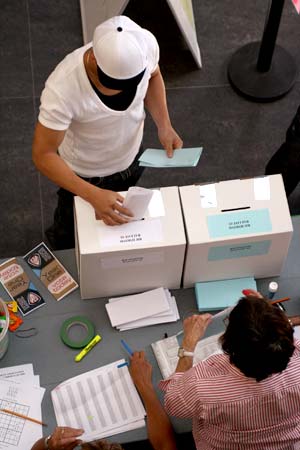Familiar feud lies within student fee referendum
September 22, 2009 by Mitch Thompson · 1 Comment

A Kwantlen student submits his referendum ballots. Volunteers were on hand to direct students towards the voting area. (Mitch Thompson photo)
Old issues between the Kwantlen Student Association and the Canadian Federation of Students have been brought back to the forefront in this week’s fee referendum.
The referendum, which runs from Sept. 21 to 24, concerns a number of proposed new fees to be paid each semester.
The KSA is supporting most of them, writing in its pamphlets, “This is your chance to build Kwantlen’s future.â€
Some of the fees are aimed at improving existing services offered by the association, such as a 65-cent-a-credit fee to provide funds for student clubs and KSA-hosted events.
Other programs suggested are 13 cents a credit for the creation of a volunteer-run online radio, Radio Free Kwantlen and a $2.50 fee per credit to aid in the creation of new student union spaces.
“We want to help the university make the transition from a university-college, to a university,†said Richmond campus director for the KSA, Reena Bali.
“A lot of the questions that are proposed, we don’t have the funding to do it without increasing the fees.â€
But the KSA is certain that these programs would be worth the added cost.
“The event [proposal] is really good because it gives us a chance to work with the school, and throw correlated events,†said Bali. “If students come in and say, ‘We want this type of event,’ we have the funding to do so.â€
Bali also supports the Students Taking an Active Role Together, or START, program, which offers volunteer opportunities to students, as well as free or discounted job-related training, such as first aid or Food Safe.
However, one question on the referendum, question 11, doesn’t deal with new programs, but rather an increase in the membership fee to belong to the Canadian Federation of Students.
The $1.78 increase doesn’t sit well with the KSA, which says that it has been directed to up the cost by the CFS’s “three separate legal entities.â€
The issue is over why the increase is needed, and what it will be used for.
“I’ve gone to two CFS meetings and they’ve never discussed it publicly in the meetings. When you do try to question them in budget, they do not answer your questions, or they say you do not have speaking rights,†said Bali.
Instead of approving the increase without student consultation, the KSA has decided to put it to vote.
“We believe students should decide whether it’s worth it to pay the Canadian Federation of Students more money than we do already,†said Bali.
Dave Molenhuis, the treasurer for the CFS, has a few criticisms of the referendum question.
“In the past, students at Kwantlen voted and have voted since on continued membership to belong to the Canadian Federation of Students, and at that time voted on the basis that there would be a membership fee,†he said.
The membership fee is set at a national general meeting of all CFS members, including the KSA.
“The premise of the question that’s being asked is that the CFS has directed the KSA to do ‘X,’ when in fact the student unions resolved to do this at a federation meeting.â€
The 2009/2010 fee is $3.99 for CFS membership and services, as well as a $3.99 fee at the provincial level. This is then adjusted for inflation using the Canadian consumer price index.
Molenhuis said that this year’s fee is equal to last year’s, and the adjustment for inflation doesn’t equal $1.78.
He doesn’t see where the KSA’s increase is coming from.
As to the stonewalling of KSA delegates looking for information on what the fees are used for, Molehuis is also skeptical.
“I haven’t been asked by the director at the Richmond campus for any information. All the documents, by-laws, constitutions, are housed in the offices of the student associations,†he said.
He also explained how the money is used.
“The fees are spent on anything from campaigns to the preparation and production of research, to travel for students to participate in lobbying sessions,†he said.
The animosity between the two organizations is not new. In 2008, the KSA held a referendum asking students if they wanted to leave the CFS: 56 per cent of Kwantlen students voted to stay.
These referendum questions could be foreshadowing another showdown.
“Last time it was pretty close,†said Bali. “We do have a petition asking students if they want to defederate.â€
Regardless of association politics, Bali and the KSA hope that Kwantlen students take the time to cast their ballot.
“I would hope that all students would vote. The only way we can operate properly as a society is to come out and vote,†said Bali.


